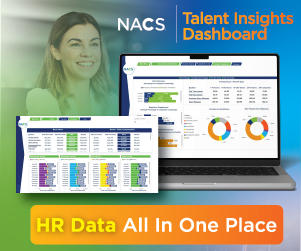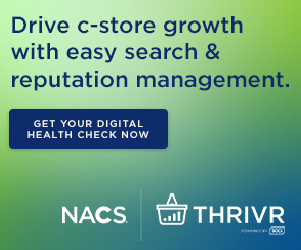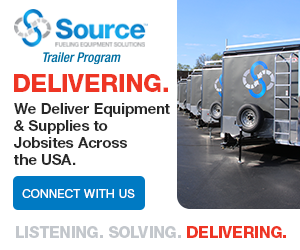By Keith Reid
Jigar Patel is the CEO of Hari 1 LLC, dba Fish River Food Mart, which is based in Fairhope, Alabama. The family owned and operated business has three stores. Patel’s uncle [name] entered the industry in 1984, and Jigar joined him in 2005. Drawing from his IT background, Patel helped convert what was a manual-process operation to an automated, digital-process business, bringing in back-office systems and scanning and inventory management. [ask about transition to CEO] In 2022, Patel created a brand for the stores called FASTTIME. One store has been rebranded and the leadership team is in the process of rebranding the other two. And the fourth one, when it comes up, will be branded FASTTIME as well.
 As one of the legislative leaders at NACS, Patel serves on the political engagement committee to support advocacy efforts as the needs arise. As a small operator, Patel works hard to ensure the industry’s needs are presented to legislators and regulators both in Washington and in his state and county. Here we discuss his motivation for becoming involved and why his peers should consider their own activism.
As one of the legislative leaders at NACS, Patel serves on the political engagement committee to support advocacy efforts as the needs arise. As a small operator, Patel works hard to ensure the industry’s needs are presented to legislators and regulators both in Washington and in his state and county. Here we discuss his motivation for becoming involved and why his peers should consider their own activism.
What prompted you to become involved in political activism?
I was introduced to it by a friend of mine, and even before that there was some curiosity in how this political system works and how it affects my business. I would see a law passed or a tax increase or the EPA has a new requirement, and I always wanted to know how all those decisions are made and whether there was a way that I could give my feedback. And, about six or seven years ago I was introduced to NACS Day on the Hill, where we went to D.C. and met with all these different congressmen and senators and talked to them about the issues that were really bothering me as a small independent operator.
I saw that there was an audience in their staffs or the representatives themselves, and they would listen to what I had to say. That’s what got me started and interested in learning more about how a bill goes through the process of becoming law and some of the things you could do to maybe influence the process. I saw that it’s very much important to be active at both the state and national levels. I share this with my peers every chance I get because it really matters. It makes a difference.
What are some of the activities you’ve taken part in aside from the Day on the Hill to keep that connection going?
We send emails regularly whenever there is a bill or an issue. We connect with congressional representatives whenever they are in town. We invite them to our stores to see behind the scenes how everything operates. Many times, it’s the education that is missing, and they don’t really know how a problem is coming up or what is driving that problem. When you take them behind the scenes, they can make educated decisions instead of just thinking what is best without that knowledge.
We also support state legislators by donating to their campaigns. And the same things—keeping in touch with them, inviting them to our meetings whenever we [my colleagues and I] all get together so they can hear from store owners directly.
What has been one of the more surprising things you’ve encountered since you started the process?
The surprising part is that not many people like me know that they need to be active on that lobbying front so that they can make a difference as well. Just having a warm body is not enough, but somebody who’s passionate about their business and who knows its needs in and out. Someone who wants to educate the lawmakers and regulators.
What is the nature of the commitments involved?
As a small business owner, when I leave from my stores and go to a Day on the Hill or other government relations conference I have to leave all of that behind. Whereas all these big corporations can just hire somebody to do these things on their behalf.
I also don’t think this is a short-term process. This is something that you need to be active in for the long haul because laws are not made overnight. It’s a long process of understanding, educating and looking to find the best solution.
A lot of folks are cynical these days about “pay to play” in politics. What is your perspective on that?
It’s not always about the person with the most money in the PAC influencing it. If you have more people that can go over there and say, ‘we may not have millions of dollars to throw at you, but we have the numbers of people that will be impacted if you pass this bill.’ I think that’s where the strength is for small people like me and for parties with less financial resources like NACS, compared to lobbying groups like the credit card industry. And yet, that’s also our weakness, because we need more people to decide that they want to do this.
What are some of the issues that you’ve addressed with legislators that are critical to the industry?
One of the biggest ones when I had just gotten active, and one of the big wins for the industry, was the Durbin Amendment which created competition on debit transaction routing on the network side. And the debit interchange and debit transaction fees came down for businesses across the country.
And now we are fighting to do the same thing on the credit card side. We are asking the lawmakers to look at the credit card fees that have gone up so much that now they’re acting as an inflation multiplier. So, we are just saying that we don’t want you to cap anything. We don’t want to limit anything. We are just asking to have competition on the credit side so that anybody who’s accepting credit cards or debit cards across the country would be able to see significant savings. Because, if you look at my businesses, just my stores, I’m spending more in credit card fees than I am in my mortgage.
What are some of the issues you’ve worked on at the state level?
Luckily, in the last few years we haven’t had to worry about much. Nothing like swipe fees. Things like zoning and permitting and things like that. But when you go to [legislators] and you share your side of the story, they are open to listen to it and provide a solution to that.
But even the little stuff can be big.
Yes, for example, the tobacco taxes in Mobile County have been going higher. And so, what happens there is that when I buy tobacco products, they come prepriced because of the tobacco taxes, and the cost of that product sometimes is higher than the price printed on the product. So that has been one of the issues that we’ve been working over the past several years.
We’ve collected data from stores and shown what the cost is in the county right next to ours and what the cost is in this county. People are driving over to the next county and buying tobacco from there, and you are losing the tobacco revenue in Mobile County. That has been an ongoing issue that we’ve been working on for the past several years, but we haven’t seen a solution to that yet. But we’ve been educating our members, so hopefully sooner or later we’ll see a solution come in our favor there.
How can someone get involved in the most effective manner possible?
I’m a big believer in not having to reinvent the wheel. If I go somewhere and I see somebody doing something that is successful, I try to learn from them and I see how I can replicate that in my life or in my business. So similarly, everybody that is in business does not have to reinvent the wheel by having to figure out how to be active on the political side. They can very easily become a member of the National Association of Convenience Stores (NACS) at a very minimal cost. They can go to their state associations and become members there and become active on that side.
See what issues that the majority of the people in the industry are talking about. Does that pertain to my business? Many a time they’ll see that those issues affect their businesses as well, and all they have to do is just become active. Organizations have streamlined ways for people to connect with their legislators where they can educate them on an issue and what it means for their operation. You know, it’s just taking that first step.









